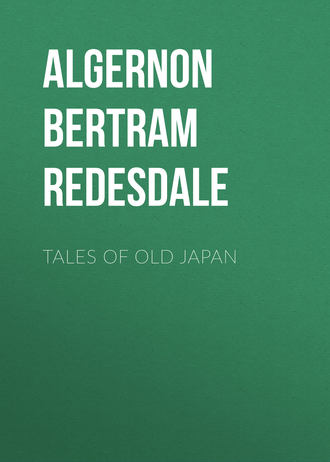 полная версия
полная версияTales of Old Japan
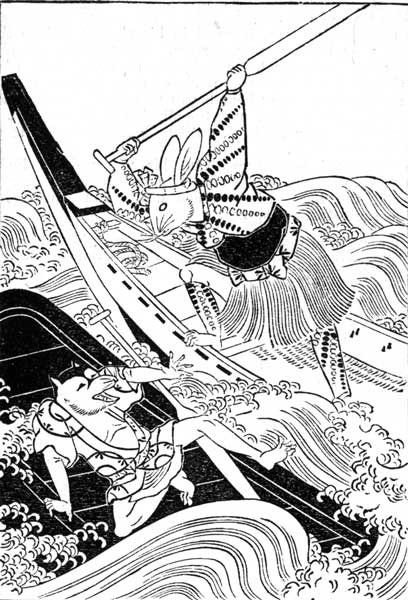
THE HARE AND THE BADGER. (2)
When, at last, the badger got well again, he went to the hare's house, thinking to reproach him for having caused him so much pain. When he got there, he found that the hare had built himself a boat.
"What have you built that boat for, Mr. Hare?" said the badger. "I'm going to the capital of the moon,"52 answered the hare; "won't you come with me?"
"I had enough of your company on the Crackling Mountain, where you played me such tricks. I'd rather make a boat for myself," replied the badger, who immediately began building himself a boat of clay.
The hare, seeing this, laughed in his sleeve; and so the two launched their boats upon the river. The waves came plashing against the two boats; but the hare's boat was built of wood, while that of the badger was made of clay, and, as they rowed down the river, the clay boat began to crumble away; then the hare, seizing his paddle, and brandishing it in the air, struck savagely at the badger's boat, until he had smashed it to pieces, and killed his enemy.
When the old man heard that his wife's death had been avenged, he was glad in his heart, and more than ever petted and loved the hare, whose brave deeds had caused him to welcome the returning spring.
THE STORY OF THE OLD MAN WHO MADE WITHERED TREES TO BLOSSOM
In the old, old days, there lived an honest man with his wife, who had a favourite dog, which they used to feed with fish and titbits from their own kitchen. One day, as the old folks went out to work in their garden, the dog went with them, and began playing about. All of a sudden, the dog stopped short, and began to bark, "Bow, wow, wow!" wagging his tail violently. The old people thought that there must be something nice to eat under the ground, so they brought a spade and began digging, when, lo and behold! the place was full of gold pieces and silver, and all sorts of precious things, which had been buried there. So they gathered the treasure together, and, after giving alms to the poor, bought themselves rice-fields and corn-fields, and became wealthy people.
Now, in the next house there dwelt a covetous and stingy old man and woman, who, when they heard what had happened, came and borrowed the dog, and, having taken him home, prepared a great feast for him, and said—
"If you please, Mr. Dog, we should be much obliged to you if you would show us a place with plenty of money in it."
The dog, however, who up to that time had received nothing but cuffs and kicks from his hosts, would not eat any of the dainties which they set before him; so the old people began to get cross, and, putting a rope round the dog's neck, led him out into the garden. But it was all in vain; let them lead him where they might, not a sound would the dog utter: he had no "bow-wow" for them. At last, however, the dog stopped at a certain spot, and began to sniff; so, thinking that this must surely be the lucky place, they dug, and found nothing but a quantity of dirt and nasty offal, over which they had to hold their noses. Furious at being disappointed, the wicked old couple seized the dog, and killed him.
When the good old man saw that the dog, whom he had lent, did not come home, he went next door to ask what had become of him; and the wicked old man answered that he had killed the dog, and buried him at the root of a pine-tree; so the good old fellow, with, a heavy heart, went to the spot, and, having set out a tray with delicate food, burnt incense, and adorned the grave with flowers, as he shed tears over his lost pet.
But there was more good luck in store yet for the old people—the reward of their honesty and virtue. How do you think that happened, my children? It is very wrong to be cruel to dogs and cats.
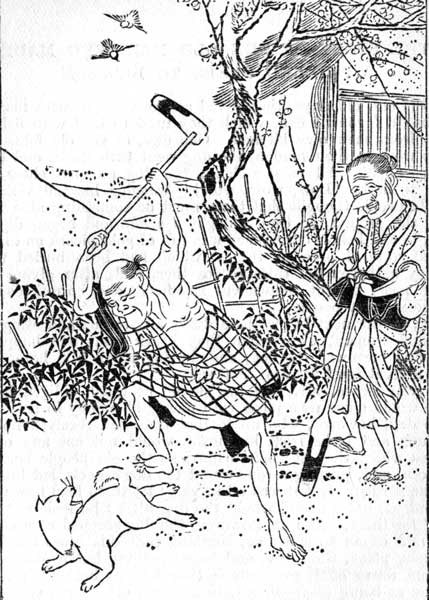
THE OLD MAN WHO CAUSED WITHERED TREES TO FLOWER.
That night, when the good old man was fast asleep in bed, the dog appeared to him, and, after thanking him for all his kindness, said—
"Cause the pine-tree, under which, I am buried, to be cut down and made into a mortar, and use it, thinking of it as if it were myself."
The old man did as the dog had told him to do, and made a mortar out of the wood of the pine-tree; but when he ground his rice in it, each grain of rice was turned into some rich treasure. When the wicked old couple saw this, they came to borrow the mortar; but no sooner did they try to use it, than all their rice was turned into filth; so, in a fit of rage, they broke up the mortar and burnt it. But the good old man, little suspecting that his precious mortar had been broken and burnt, wondered why his neighbours did not bring it back to him.

THE OLD MAN WHO CAUSED WITHERED TREES TO FLOWER. (2)
One night the dog appeared to him again in a dream, and told him what had happened, adding that if he would take the ashes of the burnt mortar and sprinkle them on withered trees, the trees would revive, and suddenly put out flowers. After saying this the dream vanished, and the old man, who heard for the first time of the loss of his mortar, ran off weeping to the neighbours' house, and begged them, at any rate, to give him back the ashes of his treasure. Having obtained these, he returned home, and made a trial of their virtues upon a withered cherry-tree, which, upon being touched by the ashes, immediately began to sprout and blossom. When he saw this wonderful effect, he put the ashes into a basket, and went about the country, announcing himself as an old man who had the power of bringing dead trees to life again.
A certain prince, hearing of this, and thinking it a mighty strange thing, sent for the old fellow, who showed his power by causing all the withered plum and cherry-trees to shoot out and put forth flowers. So the prince gave him a rich reward of pieces of silk and cloth and other presents, and sent him home rejoicing.
So soon as the neighbours heard of this they collected all the ashes that remained, and, having put them in a basket, the wicked old man went out into the castle town, and gave out that he was the old man who had the power of reviving dead trees, and causing them to flower. He had not to wait long before he was called into the prince's palace, and ordered to exhibit his power. But when he climbed up into a withered tree, and began to scatter the ashes, not a bud nor a flower appeared; but the ashes all flew into the prince's eyes and mouth, blinding and choking him. When the prince's retainers saw this, they seized the old man, and beat him almost to death, so that he crawled off home in a very sorry plight. When he and his wife found out what a trap they had fallen into, they stormed and scolded and put themselves into a passion; but that did no good at all.
The good old man and woman, so soon as they heard of their neighbours' distress, sent for them, and, after reproving them for their greed and cruelty, gave them a share of their own riches, which, by repeated strokes of luck, had now increased to a goodly sum. So the wicked old people mended their ways, and led good and virtuous lives ever after.
THE BATTLE OF THE APE AND THE CRAB
If a man thinks only of his own profit, and tries to benefit himself at the expense of others, he will incur the hatred of Heaven. Men should lay up in their hearts the story of the Battle of the Ape and Crab, and teach it, as a profitable lesson, to their children.
Once upon a time there was a crab who lived in a marsh in a certain part of the country. It fell out one day that, the crab having picked up a rice cake, an ape, who had got a nasty hard persimmon-seed, came up, and begged the crab to make an exchange with him. The crab, who was a simple-minded creature, agreed to this proposal; and they each went their way, the ape chuckling to himself at the good bargain which he had made.
When the crab got home, he planted the persimmon-seed in his garden, and, as time slipped by, it sprouted, and by degrees grew to be a big tree. The crab watched the growth of his tree with great delight; but when the fruit ripened, and he was going to pluck it, the ape came in, and offered to gather it for him. The crab consenting, the ape climbed up into the tree, and began eating all the ripe fruit himself, while he only threw down the sour persimmons to the crab, inviting him, at the same time, to eat heartily. The crab, however, was not pleased at this arrangement, and thought that it was his turn to play a trick upon the ape; so he called out to him to come down head foremost. The ape did as he was bid; and as he crawled down, head foremost, the ripe fruit all came tumbling out of his pockets, and the crab, having picked up the persimmons, ran off and hid himself in a hole. The ape, seeing this, lay in ambush, and as soon as the crab crept out of his hiding-place gave him a sound drubbing, and went home. Just at this time a friendly egg and a bee, who were the apprentices of a certain rice-mortar, happened to pass that way, and, seeing the crab's piteous condition, tied up his wounds, and, having escorted him home, began to lay plans to be revenged upon the cruel ape.
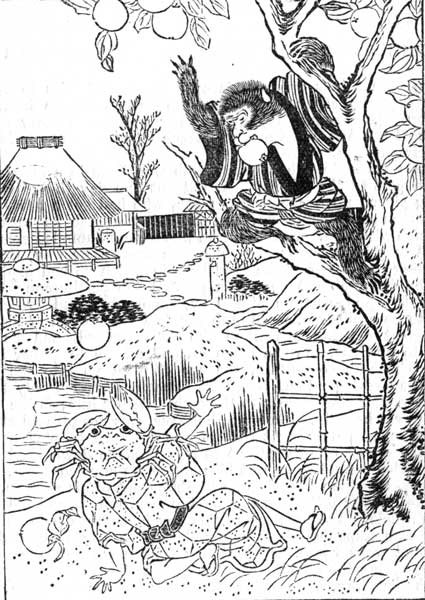
THE APE AND THE CRAB.
Having agreed upon a scheme, they all went to the ape's house, in his absence; and each one having undertaken to play a certain part, they waited in secret for their enemy to come home. The ape, little dreaming of the mischief that was brewing, returned home, and, having a fancy to drink a cup of tea, began lighting the fire in the hearth, when, all of a sudden, the egg, which was hidden in the ashes, burst with. the heat, and bespattered the frightened ape's face, so that he fled, howling with pain, and crying, "Oh! what an unlucky beast I am!" Maddened with the heat of the burst egg, he tried to go to the back of the house, when the bee darted out of a cupboard, and a piece of seaweed, who had joined the party, coming up at the same time, the ape was surrounded by enemies. In despair, he seized the clothes-rack, and fought valiantly for awhile; but he was no match for so many, and was obliged to run away, with the others in hot pursuit after him. Just as he was making his escape by a back door, however, the piece of seaweed tripped him up, and the rice-mortar, closing with him from behind, made an end of him.
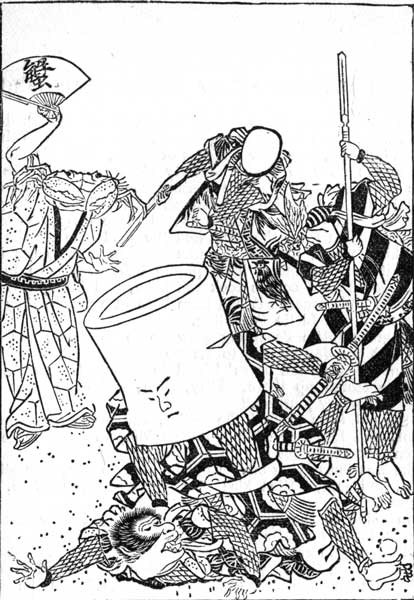
THE APE AND THE CRAB. (2)
So the crab, having punished his enemy, went home in triumph, and lived ever after on terms of brotherly love with the seaweed and the mortar. Was there ever such a fine piece of fun!
THE ADVENTURES OF LITTLE PEACHLING
Many hundred years ago there lived an honest old wood-cutter and his wife. One fine morning the old man went off to the hills with his billhook, to gather a faggot of sticks, while his wife went down to the river to wash the dirty clothes. When she came to the river, she saw a peach floating down the stream; so she picked it up, and carried it home with her, thinking to give it to her husband to eat when he should come in. The old man soon came down from the hills, and the good wife set the peach before him, when, just as she was inviting him to eat it, the fruit split in two, and a little puling baby was born into the world. So the old couple took the babe, and brought it up as their own; and, because it had been born in a peach, they called it Momotarô,53 or Little Peachling.
By degrees Little Peachling grew up to be strong and brave, and at last one day he said to his old foster-parents—
"I am going to the ogres' island to carry off the riches that they have stored up there. Pray, then, make me some millet dumplings for my journey."
So the old folks ground the millet, and made the dumplings for him; and Little Peachling, after taking an affectionate leave of them, cheerfully set out on his travels.
As he was journeying on, he fell in with an ape, who gibbered at him, and said, "Kia! kia! kia! where are you off to, Little Peachling?"
"I'm going to the ogres' island, to carry off their treasure," answered Little Peachling.
"What are you carrying at your girdle?"
"I'm carrying the very best millet dumplings in all Japan."
"If you'll give me one, I will go with you," said the ape.
So Little Peachling gave one of his dumplings to the ape, who received it and followed him. When he had gone a little further, he heard a pheasant calling—
"Ken! ken! ken!54 where are you off to, Master Peachling?"
Little Peachling answered as before; and the pheasant, having begged and obtained a millet dumpling, entered his service, and followed him. A little while after this, they met a dog, who cried—
"Bow! wow! wow! whither away, Master Peachling?"
"I'm going off to the ogres' island, to carry off their treasure."
"If you will give me one of those nice millet dumplings of yours, I will go with you," said the dog.
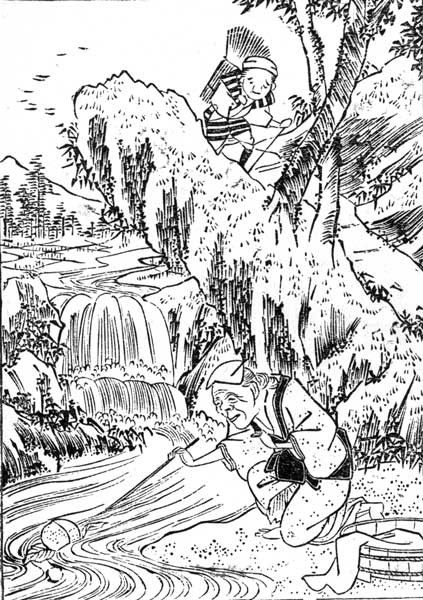
LITTLE PEACHLING.
"With all my heart," said Little Peachling. So he went on his way, with the ape, the pheasant, and the dog following after him.
When they got to the ogres' island, the pheasant flew over the castle gate, and the ape clambered over the castle wall, while Little Peachling, leading the dog, forced in the gate, and got into the castle. Then they did battle with the ogres, and put them to flight, and took their king prisoner. So all the ogres did homage to Little Peachling, and brought out the treasures which they had laid up. There were caps and coats that made their wearers invisible, jewels which governed the ebb and flow of the tide, coral, musk, emeralds, amber, and tortoiseshell, besides gold and silver. All these were laid before Little Peachling by the conquered ogres.
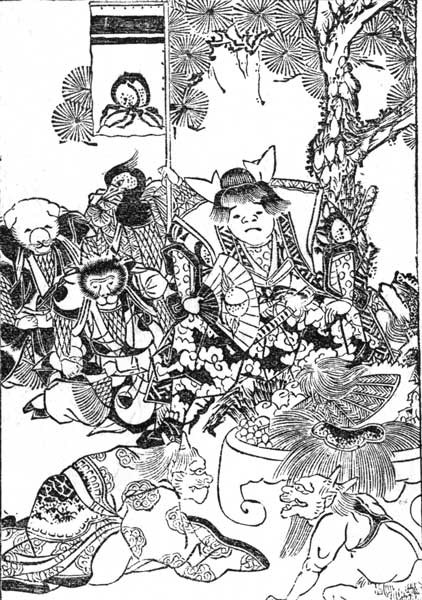
LITTLE PEACHLING. (2)
So Little Peachling went home laden with riches, and maintained his foster-parents in peace and plenty for the remainder of their lives.
THE FOXES' WEDDING
Once upon a time there was a young white fox, whose name was Fukuyémon. When he had reached the fitting age, he shaved off his forelock55 and began to think of taking to himself a beautiful bride. The old fox, his father, resolved to give up his inheritance to his son,56 and retired into private life; so the young fox, in gratitude for this, laboured hard and earnestly to increase his patrimony. Now it happened that in a famous old family of foxes there was a beautiful young lady-fox, with such lovely fur that the fame of her jewel-like charms was spread far and wide. The young white fox, who had heard of this, was bent on making her his wife, and a meeting was arranged between them. There was not a fault to be found on either side; so the preliminaries were settled, and the wedding presents sent from the bridegroom to the bride's house, with congratulatory speeches from the messenger, which were duly acknowledged by the person deputed to receive the gifts; the bearers, of course, received the customary fee in copper cash.
When the ceremonies had been concluded, an auspicious day was chosen for the bride to go to her husband's house, and she was carried off in solemn procession during a shower of rain, the sun shining all the while.57 After the ceremonies of drinking wine had been gone through, the bride changed her dress, and the wedding was concluded, without let or hindrance, amid singing and dancing and merry-making.
The bride and bridegroom lived lovingly together, and a litter of little foxes were born to them, to the great joy of the old grandsire, who treated the little cubs as tenderly as if they had been butterflies or flowers. "They're the very image of their old grandfather," said he, as proud as possible. "As for medicine, bless them, they're so healthy that they'll never need a copper coin's worth!"
As soon as they were old enough, they were carried off to the temple of Inari Sama, the patron saint of foxes, and the old grand-parents prayed that they might be delivered from dogs and all the other ills to which fox flesh is heir.
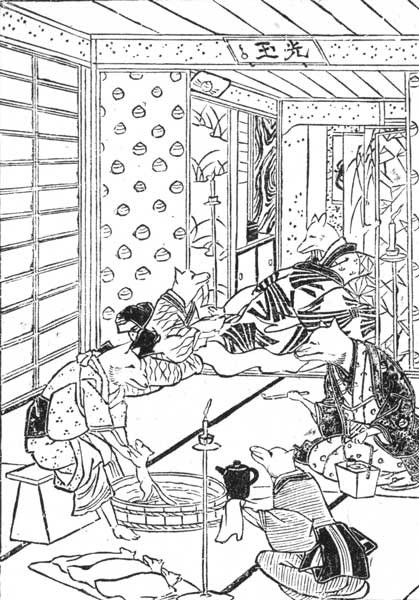
THE FOXES' WEDDING.
In this way the white fox by degrees waxed old and prosperous, and his children, year by year, became more and more numerous around him; so that, happy in his family and his business, every recurring spring brought him fresh cause for joy.
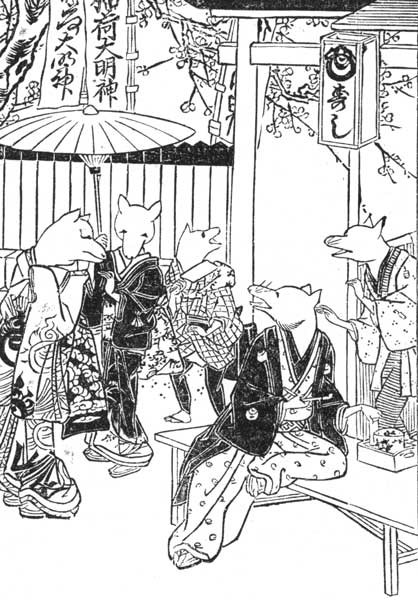
THE FOXES' WEDDING. (2)
THE HISTORY OF SAKATA KINTOKI
A long time ago there was an officer of the Emperor's body-guard, called Sakata Kurando, a young man who, although he excelled in valour and in the arts of war, was of a gentle and loving disposition. This young officer was deeply enamoured of a fair young lady, called Yaégiri, who lived at Gojôzaka, at Kiyôto. Now it came to pass that, having incurred the jealousy of certain other persons, Kurando fell into disgrace with the Court, and became a Rônin, so he was no longer able to keep up any communication with his love Yaégiri; indeed, he became so poor that it was a hard matter for him to live. So he left the place and fled, no one knew whither. As for Yaégiri, lovesick and lorn, and pining for her lost darling, she escaped from the house where she lived, and wandered hither and thither through the country, seeking everywhere for Kurando.
Now Kurando, when he left the palace, turned tobacco merchant, and, as he was travelling about hawking his goods, it chanced that he fell in with Yaégiri; so, having communicated to her his last wishes, he took leave of her and put an end to his life.
Poor Yaégiri, having buried her lover, went to the Ashigara Mountain, a distant and lonely spot, where she gave birth to a little boy, who, as soon as he was born, was of such wonderful strength that he walked about and ran playing all over the mountain. A woodcutter, who chanced to see the marvel, was greatly frightened at first, and thought the thing altogether uncanny; but after a while he got used to the child, and became quite fond of him, and called him "Little Wonder," and gave his mother the name of the "Old Woman of the Mountain."
One day, as "Little Wonder" was playing about, he saw that on the top of a high cedar-tree there was a tengu's nest;58 so he began shaking the tree with all his might, until at last the tengu's nest came tumbling down.
As luck would have it, the famous hero, Minamoto no Yorimitsu, with his retainers, Watanabé Isuna, Usui Sadamitsu, and several others, had come to the mountain to hunt, and seeing the feat which "Little Wonder" had performed, came to the conclusion that he could be no ordinary child. Minamoto no Yorimitsu ordered Watanabé Isuna to find out the child's name and parentage. The Old Woman of the Mountain, on being asked about him, answered that she was the wife of Kurando, and that "Little Wonder" was the child of their marriage. And she proceeded to relate all the adventures which had befallen her.
When Yorimitsu heard her story, he said, "Certainly this child does not belie his lineage. Give the brat to me, and I will make him my retainer." The Old Woman of the Mountain gladly consented, and gave "Little Wonder" to Yorimitsu; but she herself remained in her mountain home. So "Little Wonder" went off with the hero Yorimitsu, who named him Sakata Kintoki; and in aftertimes he became famous and illustrious as a warrior, and his deeds are recited to this day. He is the favourite hero of little children, who carry his portrait in their bosom, and wish that they could emulate his bravery and strength.
THE ELVES AND THE ENVIOUS NEIGHBOUR
Once upon a time there was a certain man, who, being overtaken by darkness among the mountains, was driven to seek shelter in the trunk of a hollow tree. In the middle of the night, a large company of elves assembled at the place; and the man, peeping out from his hiding-place, was frightened out of his wits. After a while, however, the elves began to feast and drink wine, and to amuse themselves by singing and dancing, until at last the man, caught by the infection of the fun, forgot all about his fright, and crept out of his hollow tree to join in the revels. When the day was about to dawn, the elves said to the man, "You're a very jolly companion, and must come out and have a dance with us again. You must make us a promise, and keep it." So the elves, thinking to bind the man over to return, took a large wen that grew on his forehead and kept it in pawn; upon this they all left the place, and went home. The man walked off to his own house in high glee at having passed a jovial night, and got rid of his wen into the bargain. So he told the story to all his friends, who congratulated him warmly on being cured of his wen. But there was a neighbour of his who was also troubled with a wen of long standing, and, when he heard of his friend's luck, he was smitten with envy, and went off to hunt for the hollow tree, in which, when he had found it, he passed the night.
Towards midnight the elves came, as he had expected, and began feasting and drinking, with songs and dances as before. As soon as he saw this, he came out of his hollow tree, and began dancing and singing as his neighbour had done. The elves, mistaking him for their former boon-companion, were delighted to see him, and said—
"You're a good fellow to recollect your promise, and we'll give you back your pledge;" so one of the elves, pulling the pawned wen out of his pocket, stuck it on to the man's forehead, on the top of the other wen which he already bad. So the envious neighbour went home weeping, with two wens instead of one. This is a good lesson to people who cannot see the good luck of others, without coveting it for themselves.
THE GHOST OF SAKURA
The misfortunes and death of the farmer Sôgorô, which, although the preternatural appearances by which they are said to have been followed may raise a smile, are matters of historic notoriety with which every Japanese is familiar, furnish a forcible illustration of the relations which exist between the tenant and the lord of the soil, and of the boundless power for good or for evil exercised by the latter. It is rather remarkable that in a country where the peasant—placed as he is next to the soldier, and before the artisan and merchant, in the four classes into which the people are divided—enjoys no small consideration, and where agriculture is protected by law from the inroads of wild vegetation, even to the lopping of overshadowing branches and the cutting down of hedgerow timber, the lord of the manor should be left practically without control in his dealings with his people.
The land-tax, or rather the yearly rent paid by the tenant, is usually assessed at forty per cent. of the produce; but there is no principle clearly defining it, and frequently the landowner and the cultivator divide the proceeds of the harvest in equal shapes. Rice land is divided into three classes; and, according to these classes, it is computed that one tan (1,800 square feet) of the best land should yield to the owner a revenue of five bags of rice per annum; each of these bags holds four tô (a tô is rather less than half an imperial bushel), and is worth at present (1868) three riyos, or about sixteen shillings; land of the middle class should yield a revenue of three or four bags. The rent is paid either in rice or in money, according to the actual price of the grain, which varies considerably. It is due in the eleventh month of the year, when the crops have all been gathered, and their market value fixed.
The rent of land bearing crops other than rice, such as cotton, beans, roots, and so forth, is payable in money during the twelfth month. The choice of the nature of the crops to be grown appears to be left to the tenant.

